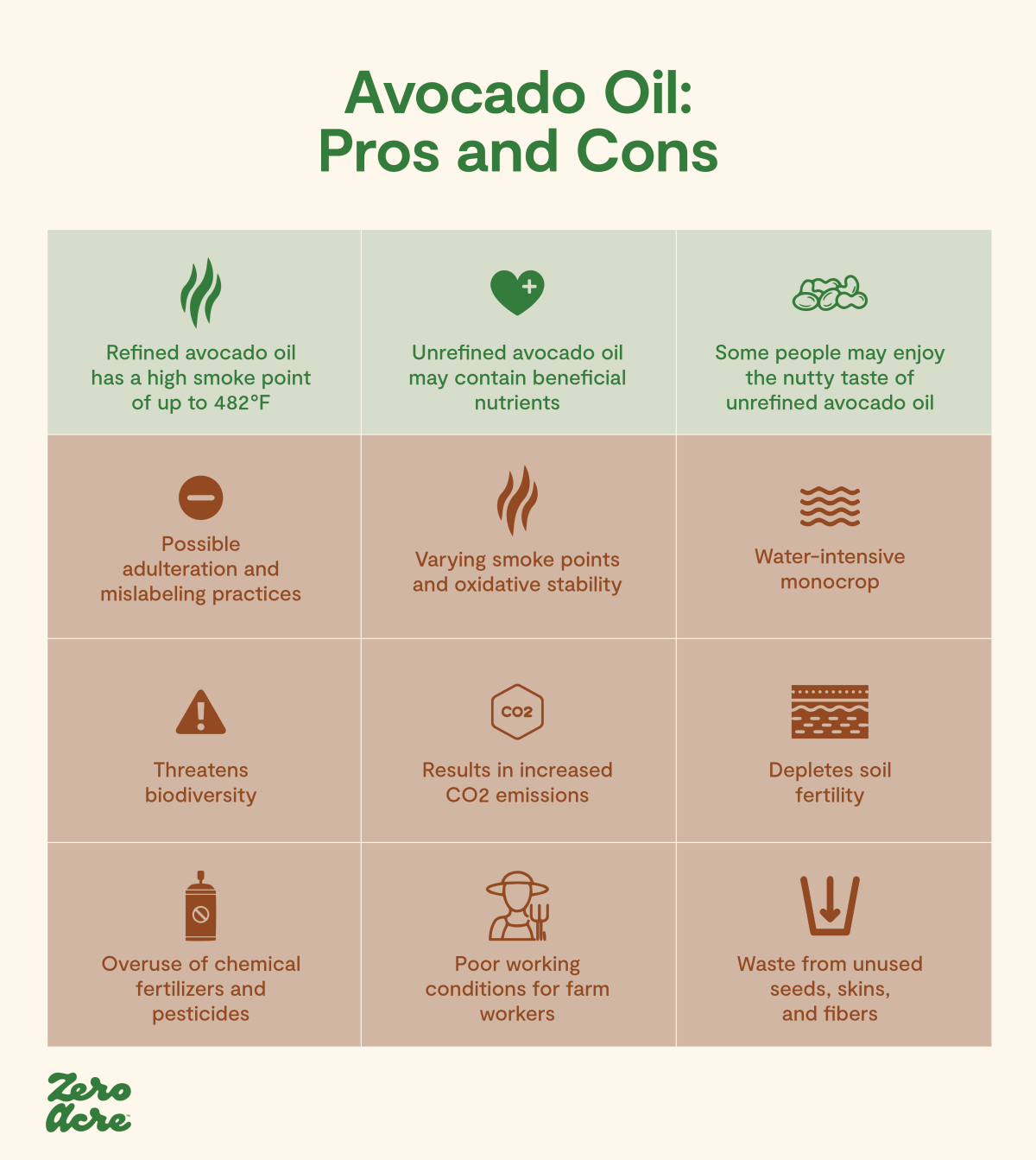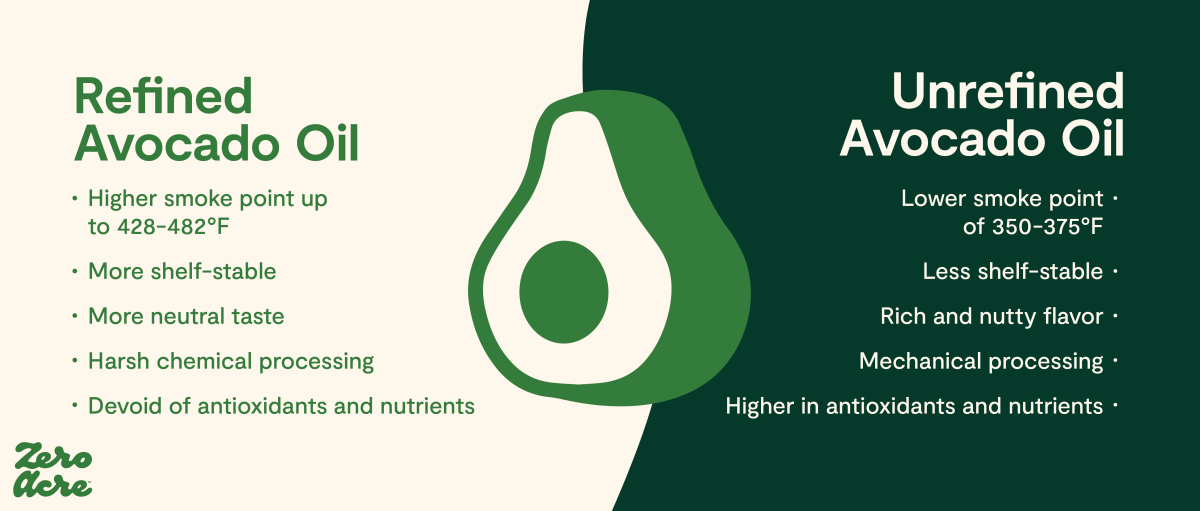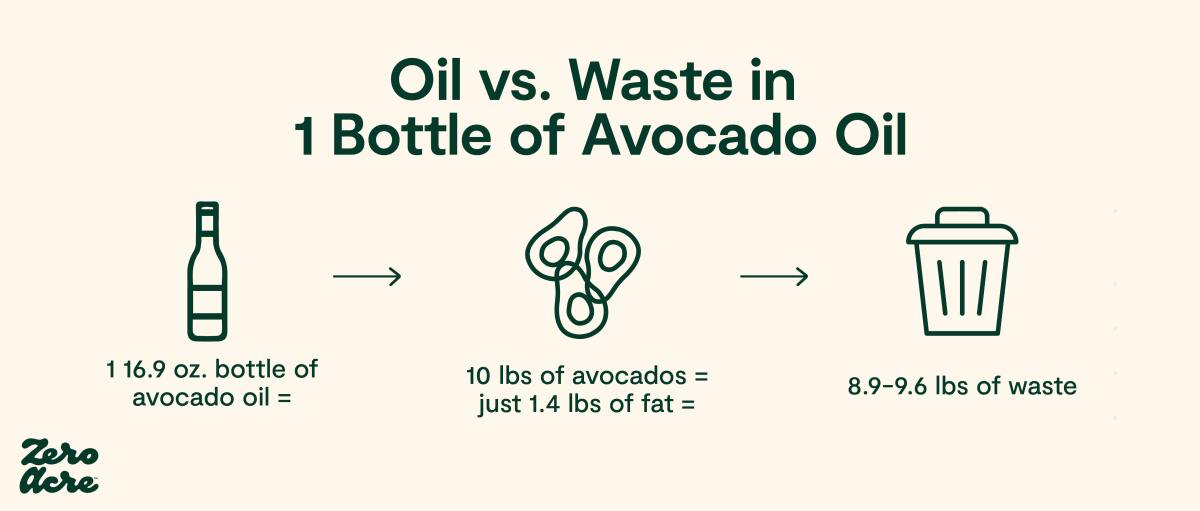WRITTEN BY: Hannah Meier, MS, RD, LDN
Article at a Glance
The nutritional value of avocado oil is not as potent as an avocado.
Is avocado oil’s purported smoke point of 520ºF too good to be true?
Upwards of 82% of avocado oils on the market today may be adulterated with cheaper, high-linoleic acid vegetable oils.
Avocado agriculture is responsible for deforestation, destruction of ecosystems, monoculture cropping, and increases in violence in Mexico.
Introduction
The marketing for avocado oil makes it tempting to believe that it’s a miracle food. High in unsaturated fats, rich in antioxidants, and what seems like an unbeatable smoke point — it’s got to be good for you, right? Rising in popularity right beside avocado toast, it’s hard to believe that edible avocado oil was nothing more than an idea a mere 30 years ago.
Exploding in popularity doesn’t come without its consequences, though, especially when it comes to the environmental impact of keeping up with the appetite of a generation of avocado lovers. It turns out that you may want to think twice about paying a premium for the “green gold” in the name of health and sustainability. Read on to learn why.
What is Avocado Oil?
Avocado oil is produced by extracting the oil from the flesh of the avocado fruit.
Traditional avocado oil production began in the mid-20th century using almost-rotten avocados leftover from harvest and was exclusively used as a cosmetic ingredient unfit for human consumption [*]. Cosmetic avocado oil relies on high temperatures, harsh solvents, chemical bleaching, and refining to produce a stable end product from the degraded fruit, and very little nutritional value remains.
Starting in the early 2000s, producers in New Zealand turned their attention to a product with more profit potential: “extra-virgin” avocado oil, produced without chemical extraction and with methods inspired by extra virgin olive oil [*]. This cold-pressed version of avocado oil promises to retain many of the characteristics of fresh avocado fruit (flavor, color, and antioxidant properties) that are lost when the oil is refined [*].
Because avocados do not fully ripen on the tree, the conditions they endure post-harvest can have a dramatic impact on the overall quality of the oil they produce. And since there aren’t currently standards to differentiate avocado oil of various qualities, it’s tough to tell which oils are better for you.
Researchers have proposed a grading system to categorize avocado oils similarly to olive oils with extra virgin oils representing those of the highest quality. This system would consider factors like ripeness, degree of damage or rot, extraction techniques, and whether or not chemicals are used in the refining process [*]. But until this system is fully in place, it's impossible to know what quality oil you’re buying at the store.

Avocado Oil Nutrition
Trader Joe’s points out in their marketing that it takes 10 pounds of avocados to produce one 16.9 oz bottle of oil [*]. Although it may be tempting to think that by using avocado oil, you’re reaping all the nutritional benefits of fresh avocados, that’s not exactly the case.
Avocados have been recognized as a high-fat fruit since ancient times and are sometimes referred to as "vegetable butter" or "butter pears," with the oil of the fruits deemed "green gold" [*]. The flesh of an avocado can contain up to 30% oil depending on its ripeness and season of harvest and also includes a relatively high amount of fiber (about 10 grams per cup of fresh avocado) and a smaller amount of protein (3 grams per cup) [*]. Along with their high fiber content, avocados are also known to provide an array of bioactive antioxidants, which have been studied to have an encouraging effect on human blood sugar stability [*,*,*].
Fresh avocados are plentiful in micronutrients as well, supplying ample amounts of vitamin C, vitamin E, vitamin K, B-vitamins, magnesium, copper, and potassium in every cup. However, these nutrients are lost in the extraction and processing of oil [*,*].
Avocado oil, on the other hand, is 100% fat. To produce it, all the fiber and protein is separated from the oil, seed, and skin [*]. The majority of the antioxidant and bioactive compounds in avocados are fat-soluble, meaning that with mechanical extraction (without high temperatures and chemical solvents), the tocopherols, chlorophylls, and carotenoids (like lutein) do end up in the final edible oil product as long as it isn't harshly refined. However, the quality and origin of the fruit used to make the oil matter as well [*,*,*].
Avocado Oil Fatty Acid Makeup
Avocado oil is pressed from the flesh of the fruit, not the seed or the skin, and is therefore not necessarily considered a “seed oil,” like other vegetable oils (grapeseed, canola, soybean, etc.) [*].
The fatty acid composition of avocado oil depends on the fatty acid composition of the flesh of the avocado fruit. As avocados grow and mature, their fatty acid composition changes, favoring an increase in monounsaturated fat — from 30% to about 50%, and a decrease in polyunsaturated linoleic acid — down from 60% to about 12% on average over the course of four months [*]. Part of what makes cold-pressed avocado oil so appealing to health experts is its abundance of monounsaturated fat , which promises health benefits comparable to olive oil [*].
Other fatty acids in avocado remain relatively stable across the growth and maturing process. Palmitic acid (a saturated fatty acid) is the second-most abundant fatty acid in avocado and avocado oil, respectively, with concentrations ranging from ~10-28% [*,*].

Because the linoleic acid content of avocado oil varies so much across its stages of maturity and region of production, it is possible to wind up with a product that has upwards of 20% linoleic acid, which is roughly the same as canola oil [*,*].
This becomes problematic when you consider that linoleic acid is one of the most abundant fatty acids in the food supply today, is exponentially increasing in prevalence, and has been implicated in a wide array of health issues across the globe [*,*,*,*,*,*,*,*].
While avocado oil is still preferable to use as a cooking oil compared to other vegetable oils like soybean or safflower in terms of its generally lower linoleic acid content, the profusion of vegetable oils in our food supply means that every gram counts — especially when not in whole food form where the relative concentration of linoleic acid is lower, and some of the naturally-occurring fibers may help temper fatty acid absorption [*].
Avocado Oil Smoke Point
One of avocado oil’s biggest selling points, and most dramatic point of differentiation between olive oil, is its higher smoke point.
The smoke point of any oil is the point at which fatty acids start to break down and produce oxidized byproducts and free radicals [*]. Oils smoke when they get too hot, an experience you may be familiar with if you’ve left your pan unattended for too long at the stovetop.
While you probably cook at temperatures ranging from 300-400 degrees Fahrenheit when cooking using medium heat on a stovetop or deep frying, it’s possible to reach temperatures as high as 600 degrees when searing meat or sautéeing veggies [*,*].
Many avocado oils claim an outrageously high smoke point of 520 degrees, making them appealing for chefs and home cooks who don't want to worry about unwanted oxidized byproducts or off flavors in their dishes. This is a far cry from extra virgin olive oil, which smokes at the low temperatures of 325-375 degrees Fahrenheit.
But according to the scientific literature, the highest cited smoke point for avocado oil is 482 degrees Fahrenheit [*,*,*]. In order to have a smoke point of 520 degrees Fahrenheit, an oil would have to have a free fatty acid concentration of almost zero, which is usually not possible in commercial practice. And it’s especially not true for extra virgin avocado oils, which are unrefined and less shelf stable [*]. Chosen Foods points out that virgin avocado oil will smoke at 350-375 degrees, which is very similar to olive oil [*].
Is Avocado Oil Healthy?
Avocado oil has the potential to contribute positive benefits to overall health through high concentrations of unsaturated fatty acids, polyphenols, and antioxidants. It's also been studied to improve health outcomes in experimental settings [*,*]. However, life exists outside the lab, and the true health effects of singular foods are almost impossible to isolate.
For one thing, it’s impossible to completely avoid potentially harmful linoleic acid in avocado oil, which has been connected in literature to health issues from diabetes, to osteoarthritis, autoimmune diseases and more [*,*,*,*,*,*,*]. Depending on the overall linoleic acid concentration in the rest of your diet, avocado oil may tip the scales towards an unfavorable ratio of linoleic acid, which could be avoided by replacing avocado oil with a lower-linoleic acid cooking oil like Cultured Oil.
Then there’s the issue of avocado oil adulteration and mislabeling. A recent study from UC Davis — the first to look into avocado oil adulteration — found that upwards of 82% of avocado oil samples purchased online and in store were rancid or mixed with other oils like soybean, safflower, or sunflower oil [*]. Shockingly, the study found that in three cases, bottles labeled “pure” or “extra virgin” avocado oil contained almost 100% soybean oil — a much cheaper oil with a far inferior nutritional profile compared to avocado oil [*].
Professor Susan Wang, one of the lead authors in this study, presented at the 2022 Future of Fat summit and highlighted the adulteration of avocado oil and other high-value oils in depth.
Whether or not avocado oil is healthy for you will likely depend on the rest of your diet and lifestyle overall, and whether the bottle of oil you’re using is even avocado oil at all.
Avocado Oil Taste
Tastewise, unrefined (virgin and extra virgin) avocado oils retain the flavor of fresh avocados, which experts often describe as “mushroomy,” or “rich and nutty” [*]. The more refined and processed the oil is, the more neutral it will taste — unfortunately, at the expense of its nutritional benefits.
To highlight the flavor of extra virgin avocado oil, culinary pros recommend reserving its use for drizzling and finishing, similar to how they recommend using olive oil, while they recommend refined avocado oil for cooking applications [*].
It’s important to consider the tradeoffs here. While unrefined, extra virgin olive oil retains the most nutritional benefit, it offers the least versatility in terms of flavor and culinary application. Refined avocado oil, on the other hand, is more neutral in flavor and suitable for high-heat cooking, but is produced using a harsh chemical process that reduces the antioxidant content of the final product [*].

Avocado Oil and Sustainability
To understand the impact of avocado oil on the environment, we need to take a critical look at avocado agriculture as it exists today. Avocado oil is generally produced from “reject-grade” avocados that are unsuitable for export as whole fruit. In other words, they might have deformities or imperfections that are unappealing to customers [*,*].
This production model increases profitability for farmers who may not have otherwise been able to sell the "rejected" fruits and increases yield efficiency from a grower's perspective. However, these two "silver linings" may not be enough to rescue avocado oil from its overall hefty impact on farm workers and the environment.
As avocados and avocado oil have skyrocketed in popularity in countries like the U.S., pressure to cultivate and export the profitable avocado has threatened to turn avocado agriculture into something that looks and feels all too similar to the now infamous palm oil industry in Indonesia.
To keep up with rising avocado demand, existing forests in Central and South America are being cleared at an alarming rate to make way for the water-intensive monocrop, threatening existing biodiversity and straining the ability of our planet to offset greenhouse gas emissions [*].
The vast majority of avocados grown are of the Hass variety, which have thick skins and are easy to transport [*]. Unfortunately, relying on a single variety of avocado to supply the world’s cravings increases the risk that a disease outbreak could be catastrophic to the supply chain.
Not to mention, monoculture like this is notorious for depleting soil fertility, threatening plant growth long term, and leading to the overuse of chemical fertilizers and pesticides [*].
Mexico is currently the leading producer of avocados globally, and working conditions for farmers here are increasingly horrific [*]. Mexican cartels have turned their attention to avocado agriculture for profit, and have been seizing farms and burning protected woodlands to plan their own groves of avocado trees, violently contributing to increasing homicide rates and climate change [*,*].
Avocado trees are temperamental plants that are sensitive to climate shifts and require irrigation in order to produce a reliable yield. In Mexico alone, it’s estimated that around 9.5 billion liters of water are used in irrigation daily for growing avocados, equivalent to 3,800 Olympic pools [*,*].
Up to 320 liters of water are needed to produce one avocado alone in particularly dry climates like Chile [*]. All of this irrigation places extreme pressure on existing aquifers in Mexico, and has opened up subsoil caverns experts believe are leading to increases in seismic movements (small earthquakes) in avocado-producing regions [*].
While cold-pressed avocado oil is more nutrient dense, it also produces a vast amount of hard-to-rescue waste from the unused seeds, skins, and fibers that are leftover after the oil is extracted. Mechanical extraction techniques used to produce extra virgin avocado oils are relatively inefficient compared to traditional solvent extraction methods, with only 30-80% of the oil recovered in mechanical and centrifugation systems compared to 60-90% in solvent systems [*].
Let’s say avocados are, on-average, 14% fat. For the 10 pounds of avocados required to produce a single bottle of Trader Joe’s avocado oil [*], 1.4 pounds are fat. Of this total amount of available fat, only 30-80% is extracted, leaving 8.9 to 9.6 pounds of waste behind that is most likely siphoned off for use in factory farm animal feed [*].

The Takeaway
Avocado agriculture needs an intervention. The current practices of deforestation and monoculture farming are unsustainable and threatening to the future of both the supply chain and our planet. What’s more, avocado oil production contributes to a waste stream that fuels our reliance on factory farms for animal meat.
While on the surface, avocado oil appears to be a decent nutritional alternative to other vegetable oils high in unfavorable fatty acids, it runs a high risk of being diluted with cheap vegetable oils due to surging demand and lack of regulation. While avocado companies will tempt you with high smoke point promises, unrefined and cold-pressed avocado oil with the most nutritional benefit does not deliver this.
If you want to harness the health benefits of avocado, you’re better off sticking to the whole fruit which also provides some fiber and an array of vitamins and minerals along with the healthy fats, and leave the oil to us.